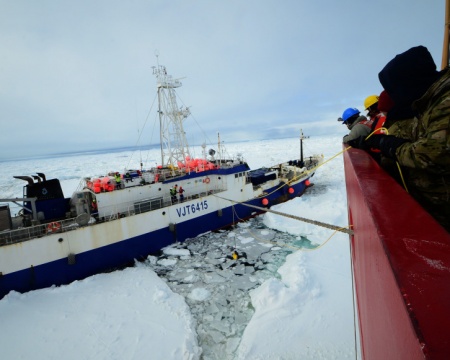After meeting with the 207-foot fishing vessel Antarctic Chieftain, the crew of the Coast Guard icebreaker Polar Star took the vessel in a stern tow. The two vessels are surrounded by ice that is 12 feet to 15 feet thick covered with two feet of snow. Towing in ice is much more hazardous than towing in open water and is a slow process. The crew of the Polar Star and Antarctic Chieftain must remain vigilant and ready to respond to changing ice conditions. Upon reaching a small area of open water, also known as a polynya, the Antarctic Chieftain will commence testing the vessel’s ability to steam under its own power. Once testing is complete, Polar Star and the Antarctic Chieftain will proceed north through another 60 miles of ice.
RCC New Zealand requested that the U.S. Coast Guard cutter Polar Star, homeported in Seattle, respond to the Antarctic Chieftain’s request for assistance. The 150-person crew of the Polar Star was deployed to McMurdo Station, Antarctica, as part of Operation Deep Freeze, which provides military logistical support to the U.S. Antarctic Program (USAP). The National Science Foundation manages the USAP.
The Polar Star is the nation’s only heavy icebreaker capable of operating in the thick Antarctic ice for a mission such as breaking out the Antarctic Chieftain or clearing McMurdo Sound for the annual resupply of McMurdo Station. The 399-foot cutter is one of the largest ships in the Coast Guard and one of the world's most powerful non-nuclear icebreakers.
Maritime New Zealand manages RCC New Zealand, which is responsible for all major maritime and aviation search and rescue missions within New Zealand’s search and rescue region. Maritime New Zealand is responsible for the coordination of search and rescue, maritime environmental protection, maritime transportation and numerous other maritime missions in New Zealand.
Pacific Area is the Coast Guard’s regional command element and force provider for maritime safety, security, and stewardship in the Pacific. The Coast Guard’s Pacific Area encompasses six of the seven continents, 71 countries, and more than 74 million square miles of ocean -- from the U.S. West coast to Asia, and from the Arctic to Antarctica.
For video and photos of Polar Star’s recent operations in support of the National Science Foundation’s Antarctic program in McMurdo Sound, please click here.





